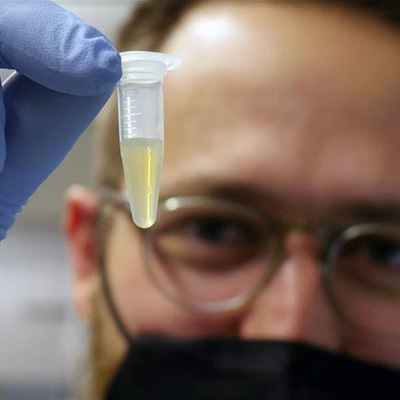October 26, 2020 -- A new assay that detects the unique SARS-CoV-2 orf8 protein in the sera of COVID-19 patients in the early stage of the infection is a strategic step in controlling the COVID-19 pandemic, according to research published online October 20 in mBio.
Essentially, microbiologists at the University of Hong Kong and colleagues elsewhere found that detecting anti-orf8 antibodies is more sensitive and accurate than the conventional antinucleoprotein (anti-N) antibody detection used in identifying COVID-19 patients especially during the early stage of infection.
Being able to accurately diagnose SARS-CoV-2 infection in its early stages is a critical development. Current serological diagnostics for COVID-19 patients detect antibodies against the SARS-CoV-2 nucleoprotein and spike glycoprotein, but usually during the mid- or late-stage of infection. So, these tests are not extensively used for diagnosing COVID-19 in its early stages.
A key epidemiological feature of COVID-19 is the presence of many asymptomatic patients with high viral loads who might contribute to the disease's high transmissibility rate. So, getting a handle on the virus, through early, rapid, and accurate diagnosis of SARS-CoV-2 infection goes a long way toward global control of the disease.
Molecular and serological assays have been the leading recommended routine diagnostic tests for COVID-19. Molecular assays may be sensitive and specific, but require trained professionals and laboratory equipment, which hinders their use in large-scale diagnostic screening efforts.
Traditional serological assays are rapid, inexpensive, and can be performed at the point of care, but may not be best for making an early diagnosis. Several commercially available serological assays detect serum anti-N or anti-receptor-binding domain (RBD) antibodies in almost all reverse transcription polymerase chain reaction (RT-PCR)-positive COVID-19 patients at 28 days or later post-symptom onset.
Now, microbiologists at the University of Hong Kong and colleagues have specifically harnessed the novel SARS-CoV-2 orf8 as a novel immunogenic secreted protein. They examined and characterized the protein for the accurate diagnosis of COVID-19.
Xiaohui Wang of the department of microbiology at the University of Hong Kong wrote that he and other microbiologists detected extracellular orf8 protein in cell culture supernatant and in the sera of COVID-19 patients. They reported that the orf8 accessory gene is absent from other human-pathogenic coronaviruses, yet it exists in the SARS-CoV-2 genome.
In addition, orf8 was found highly immunogenic in COVID-19 patients, who showed early seropositivity for anti-orf8 immunoglobulin M (IgM), IgG, and IgA. The microbiologists postulated that orf8 secretion during SARS-CoV-2 infection facilitates early mounting of the B-cell response, and that a serological test detecting anti-orf8 IgG antibody can be used for the early and accurate diagnosis of COVID-19.
Most importantly, the microbiologists' serological test detected anti-orf8 antibodies in all COVID-19 patients' sera. Even though the anti-N antibody could not be detected, the patients' respiratory specimens were reverse transcription-quantitative PCR (RT-qPCR) positive, as determined by molecular assays. This suggested that the production of orf8 antibodies occurs much earlier than that of anti-N antibodies, the authors wrote.
Since orf8 is a secreted viral protein that could be detected in sera of hospitalized COVID-19 patients, the scientists questioned if orf8 is immunogenic. They tested for the presence of anti-orf8 antibodies in infected patients using the scientists' in-house orf8 enzyme-linked immunosorbent assay (ELISA). Serum samples were collected from 29 adult COVID-19 patients starting at 28 days post-symptom onset.
All patients were confirmed to have COVID-19 by RT-qPCR during their acute phase of infection. All tested COVID-19 patient serum samples were positive for IgG against orf8 in the orf8 ELISA.
The scientists had found that the titers of anti-N IgG, IgM, and IgA increased in COVID-19 patients after they were infected. They also analyzed the anti-N antibodies using their in-house N ELISA. The seropositive rates regarding anti-N IgG, IgM, and IgA were reasonably high in this cohort of patients, suggesting that orf8 is highly immunogenic in eliciting an antibody response in COVID-19 patients.
Many commercially available serological assays can detect anti-N or anti-RBD antibodies in almost all PCR-positive serum samples from COVID-19 patients at 28 days or later post-symptom onset. But the percentage of seropositivity decreases when the sera were harvested before 28 days post-symptom onset, which makes such tests not reliable for early diagnosis and management.
The researchers wrote that because the secreted orf8 protein efficiently elicits anti-orf8 antibody response in infected patients, they wondered whether anti-orf8 antibodies could be detected during early infection when anti-N/RBD is not yet detected. So, they additionally examined the presence of anti-orf8 antibodies in a panel of 64 sera from RT-qPCR-confirmed COVID-19 patients at 28 days or earlier post-symptom onset.
To their surprise, anti-orf8 IgG antibodies could be detected in all 64 serum samples, including 32 Abbott-negative samples, as diagnosed by the automated Abbott Architect SARS-CoV-2 IgG immunoassay, according to the scientists.
In addition, the investigators examined the presence of anti-orf8 IgA antibodies in both Abbott-positive and -negative serum samples and found that 95.3% were anti-orf8 IgA positive. Notably, four of the 64 PCR-confirmed patients were asymptomatic but showed seropositivity for both anti-orf8 IgG and IgA.
The authors wrote that they profiled anti-N IgG and IgA levels using their in-house anti-N ELISA. Consistent with the diagnostic result of Abbott Architect immunoassay, the Abbott-seropositive samples yielded significantly increased anti-N IgG and IgA compared with healthy donors, while the Abbott-negative samples constituted around 68.8% or 39.1% of the readings above the cutoff lines.
These results suggested that detecting anti-orf8 antibodies is more sensitive and accurate than conventional anti-N antibody detection when identifying COVID-19 patients during the early stage of infection.
Copyright © 2020 scienceboard.net







